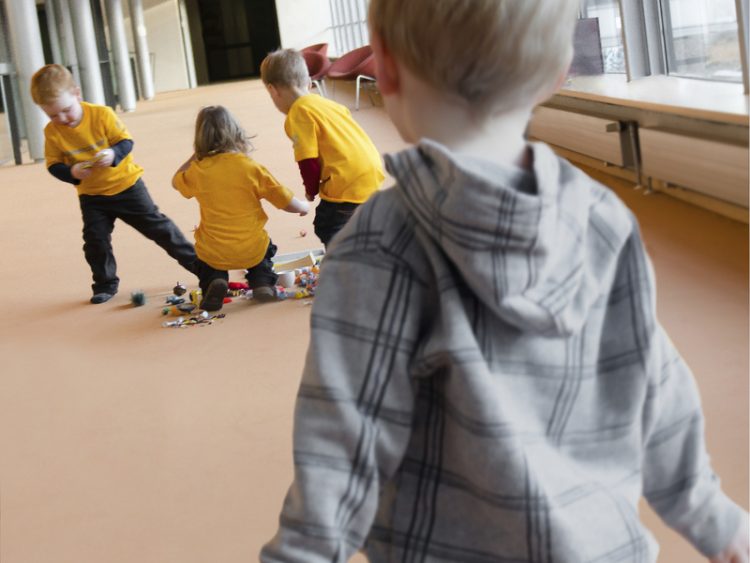Don't be an outsider!

Children as young as two years old already experience peer pressure and adapt their behaviour to fit in. © MPI f. Evolutionary Anthropology/ R. Barr
Children and chimpanzees often follow the group when they want to learn something new. But do they actually forego their own preferences in order to fit in with their peers?
In direct comparisons between apes and children, a research team from the Max Planck Institute for Evolutionary Anthropology in Leipzig and Jena University has found that the readiness to abandon preferences and conform to others is particularly pronounced in humans – even in two-year-old children.
Interestingly, the number of peers presenting an alternative solution appeared to have no influence on whether the children conformed.
From the playground to the boardroom, people often adapt their behaviour to those around them in order to fit in with a particular group. In humans, this conformity appears in childhood, but it is not evidenced in chimpanzees or orangutans.
“Conformity plays a central role in human social behaviour, defining and delimiting different groups and helping them coordinate their activities. It stabilizes and promotes cultural diversity, one of the characteristic features of the human species”, says psychologist Daniel Haun of the Max Planck Institute for Evolutionary Anthropology, who headed the study.
This is not to say that it is always best to comply with the majority. Conformity can be good or bad, helpful or unhelpful, appropriate or inappropriate, for both the individual and the group. “The fact is that we often do conform, and our social structure would be completely different if this were not the case. Our study shows that children as young as two adapt their behaviour to fit in, while chimpanzees and orangutans stick with what they know”, says Haun.
In an earlier study, Haun and his colleagues found that children and chimpanzees rely on the majority opinion when they are learning something new. This makes a lot of sense, as the group has knowledge that the individual may not be aware of.
However, other studies show that human adults sometimes conform even when they already have the relevant knowledge, just to avoid standing out from the crowd. To find out whether young children and apes also show this “normative” conformity, Haun and his co-authors Michael Tomasello and Yvonne Rekers presented two-year-old children, chimpanzees and orangutans with a similar task.
In these experiments, the children and apes were to drop a ball into a box that contained three separate sections. Only one of these sections delivered a reward: a peanut for the apes, and a chocolate drop for the children.
After familiarizing themselves with the box, each participant then watched while several peers deposited their balls into a different section from the one the participant associated with a reward. When it was the participant's turn again, he or she had to choose a section while the other three children looked on.
The results revealed that the children were more likely to adjust their behaviour to that of their peers than were the apes. The children conformed more than half the time, while the chimpanzees and orangutans practically ignored their peers and stuck to their learned strategy.
A follow-up study with two-year-olds showed that children were more likely to switch their choice when observed by their peers, but stayed with their original strategy when left alone. It is interesting to note that participants showed the same propensity to conform independently of whether the alternative was presented by one or three peers. This conformity among toddlers shows that the motivation to fit in emerges very early in humans.
“We were surprised to find that children as young as two change their behaviour to avoid the potential disadvantage of being different”, says Haun.
The researchers are currently investigating the impact of environmental factors, such as schooling and different child-rearing methods, on children's tendency to conform.
Contact
Dr. Daniel HaunMax Planck Institute for Evolutionary Anthropology, Leipzig Phone: +49 341 3550-815 Email: haun@eva.mpg.de Sandra Jacob Press and Public Relations
Max Planck Institute for Evolutionary Anthropology, Leipzig Phone: +49 341 3550-122 Fax: +49 341 3550-119 Email: info@eva.mpg.de
Original publication
Daniel B.M. Haun, Yvonne Rekers, and Michael Tomasello
Children Conform to the Behavior of Peers; Other Great Apes Stick With What They Know
Psychological Science, online veröffentlicht 29 October 2014 (doi: 10.1177/0956797614553235)
Media Contact
More Information:
http://www.mpg.de/8731396/kids-peer-behaviour-apesAll latest news from the category: Social Sciences
This area deals with the latest developments in the field of empirical and theoretical research as it relates to the structure and function of institutes and systems, their social interdependence and how such systems interact with individual behavior processes.
innovations-report offers informative reports and articles related to the social sciences field including demographic developments, family and career issues, geriatric research, conflict research, generational studies and criminology research.
Newest articles

Compact LCOS Microdisplay with Fast CMOS Backplane
…for High-Speed Light Modulation. Researchers from the Fraunhofer Institute for Photonic Microsystems IPMS, in collaboration with HOLOEYE Photonics AG, have developed a compact LCOS microdisplay with high refresh rates that…

New perspectives for material detection
CRC MARIE enters third funding period: A major success for terahertz research: Scientists at the University of Duisburg-Essen and the Ruhr University Bochum have been researching mobile material detection since…

CD Laboratory at TU Graz Researches New Semiconductor Materials
Using energy- and resource-saving methods, a research team at the Institute of Inorganic Chemistry at TU Graz aims to produce high-quality doped silicon layers for the electronics and solar industries….



